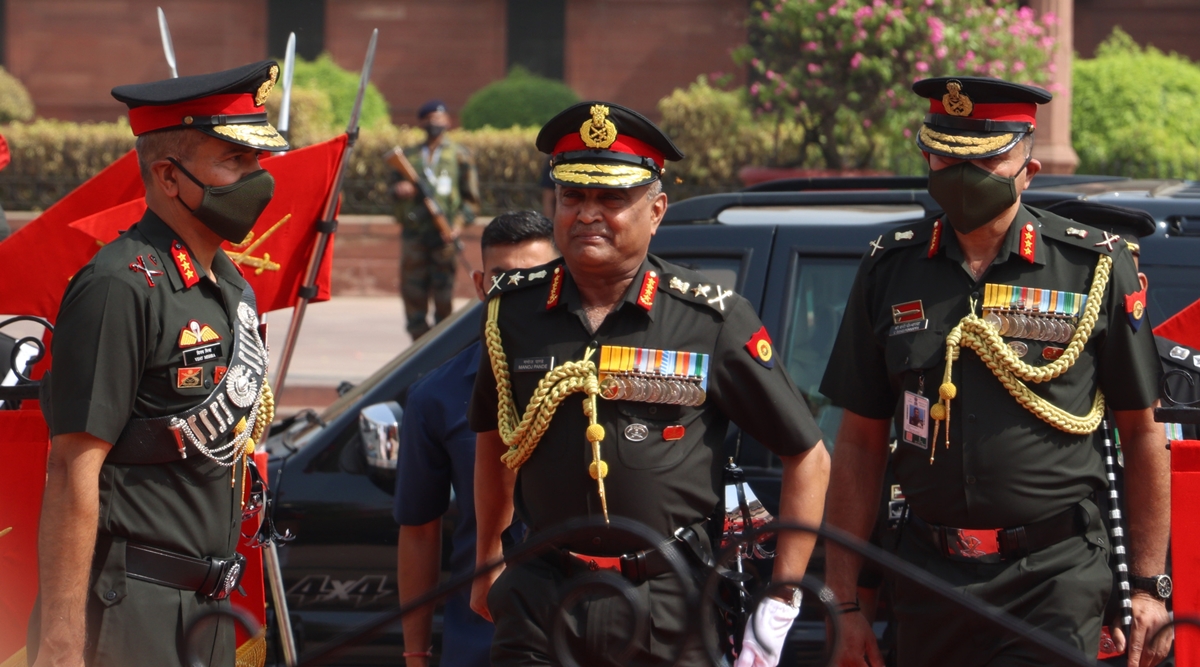 Army Chief Manoj Pande. (Express File Photo By Amit Mehra)
Army Chief Manoj Pande. (Express File Photo By Amit Mehra)Two months after Indian and Chinese troops disengaged at Patrolling Point 15 in the Gogra-Hot Springs area of eastern Ladakh, Army chief General Manoj Pande on Saturday said the situation on the Line of Actual Control (LAC) was “stable but unpredictable”.
He said infrastructure development by the Chinese on their side of the LAC was going on “unabated”.
“If I have to describe in a single sentence, I would say the situation is stable but unpredictable,” General Pande said when he was asked about the situation in Ladakh at the Chanakya Dialogues in New Delhi.
He indicated that India was now preparing for the next round of military talks with China. Round 16 of talks at the level of the Corps Commanders had led to the disengagement in September at PP 15 where Indian and Chinese troops had been in a faceoff for over two years.
“You are aware of the ongoing talks at the political, diplomatic and military levels which have been going on between the two sides. Because of these talks we have been able to find resolution in five of the seven friction points which were on the table. And it is for the next two friction points that we are attempting to seek resolution,” the Army chief said.
“The 25th round of the WMCC (Working Mechanism for Consultation and Coordination on India–China Border Affairs), which took place on 15th October, has set the stage …we are looking at the next date for the 17th round. And that is where, through talks, through negotiations, through dialogue, we hope to find resolution in these two areas,” he said.
The two remaining friction points are the Charding Nala in Demchok and the Depsang Plains where Chinese forces have blocked Indian access to many traditional patrolling points.
General Pande also indicated that though there is disengagement, no de-escalation is in sight at the moment.
“As far as the PLA force level is concerned, there has been no significant reduction. While there were… formations, there were brigades which had come for the purposes of collective training, with the onset of winters there are indications of them going back. But on the LAC itself, there is no reduction of strength,” he said.
On the Chinese infrastructure development along the LAC, he said, “In terms of infrastructure development, that is going unabated. There is road infrastructure, helipads, airfields including roads right up to the passes. One of the notable developments has been the G695 road or highway, running parallel to the LAC, which will give them the ability to not only move forces forward but also switch forces from one sector to another.”
The Army chief said though India was prepared for all contingencies, it had to calibrate its response.
“As far as our preparations are concerned, our transition to the winter posture is currently underway. But we have also made sure we have adequate forces and adequate reserves to deal with this contingency. In a larger context, we need to very carefully calibrate our actions on the LAC to be able to safeguard both our interests and sensitivities, yet be prepared to deal with all types of contingencies,” he said.
Pande also spoke on the transformational changes the Army is going through to make itself more modern to be able to meet contemporary and future battlefield challenges.
Former IAF chief R K S Bhadauria, who also spoke at the event, referred to poor coordination among ground and air forces of Russia in the ongoing Russia-Ukraine conflict.
On a question related to military strategy applied by Russian forces, Air Chief Marshal (retired) Bhadauria said, “Absolute lack of integration and thoughtful policy. The ground forces going without… and forces being tackled. Whole lot of columns of tanks getting attacked and nothing being done about it. This is total lack of integration and lack of use of air power. If air power was used there properly, it would have been a different story. The air element (in Russia) was put under the ground commander and still not utilised. It is something we need to question. It either shows lack of understanding or abilities or sheer belief that they could just roll through it.”
He said Indian forces work differently and there is complete integration.